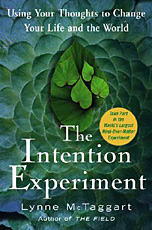"A textbook definition of intention characterizes it as 'a purposeful plan to perform an action, which will lead to a desired outcome,' unlike a desire, which means simply focusing on an outcome, without a purposeful plan of how to achieve it. An intention was directed at the intender's own actions; it required some sort of reasoning; it required a commitment to do the intended deed. Intention implied purposefulness: an understanding of a plan of action and a planned satisfactory result." This helpful definition of intention is from Lynne McTaggart, an award-wining investigative journalist, an internationally recognized spokesperson on the science of spirituality. and the author of five books including The Field: The Quest for the Secret Force of the Universe.
Over the years, many spiritual healers, Buddhist monks, Quigong masters, and shamans have used their thoughts to bring about changes in themselves, in others, and in the world. They have taught us that "reality is not fixed, but fluid, or mutable, and hence possibly open to influence." McTaggert presents an overview of scientific experiments conducted in the field of human consciousness on the power of the mind to influence reality. She then suggests ways we can use intention in our everyday lives by powering up, reaching a state of peak intensity, developing mindfulness, merging with the "other," being compassionate, and specifically stating the intention.
McTaggart concludes with an invitation to readers to participate in an experiment in intention on her website: www.theintentionexperiment.com. The author is convinced that collective intention can have a significant impact on global problems if we just use the positive energy that we possess to make the world a better place.
